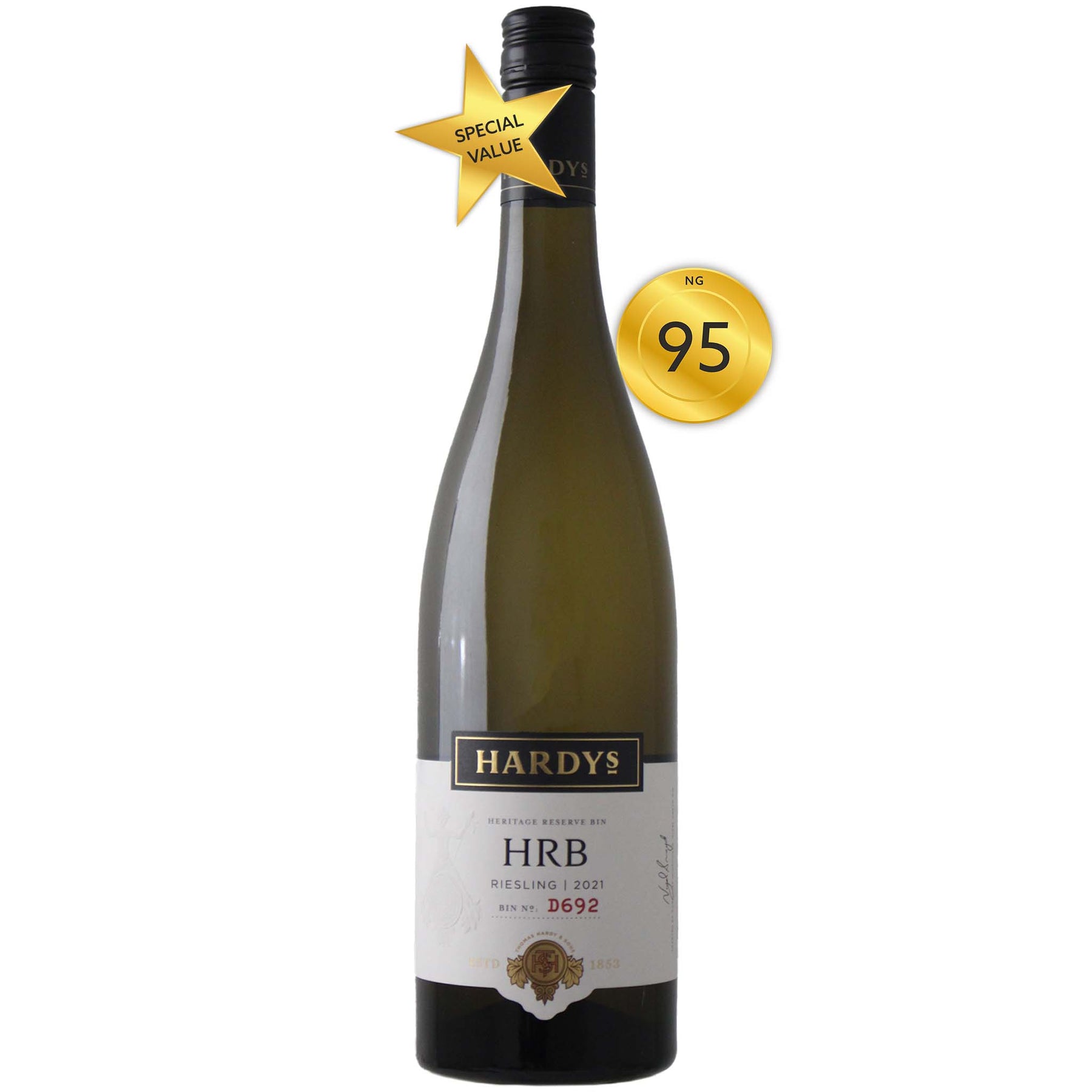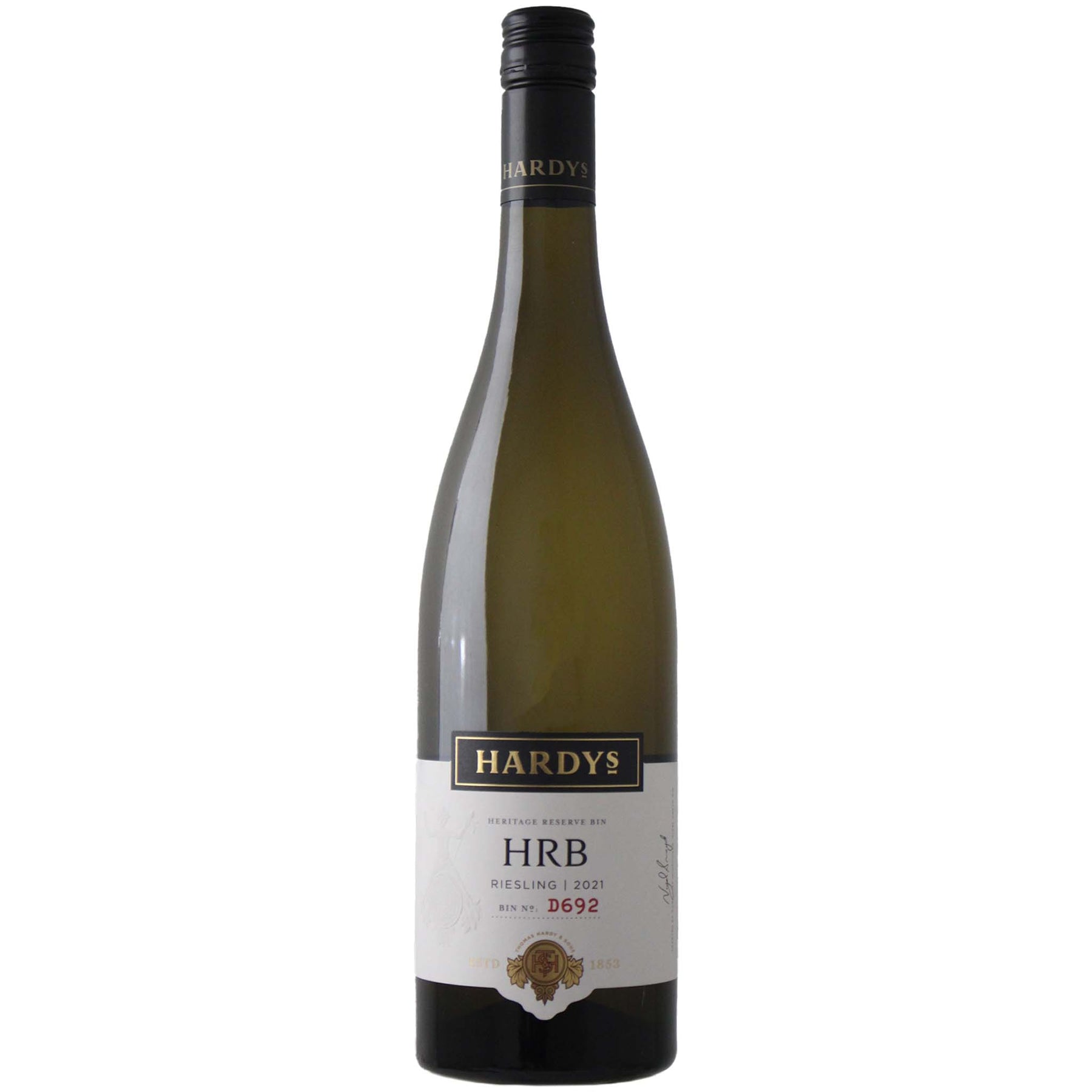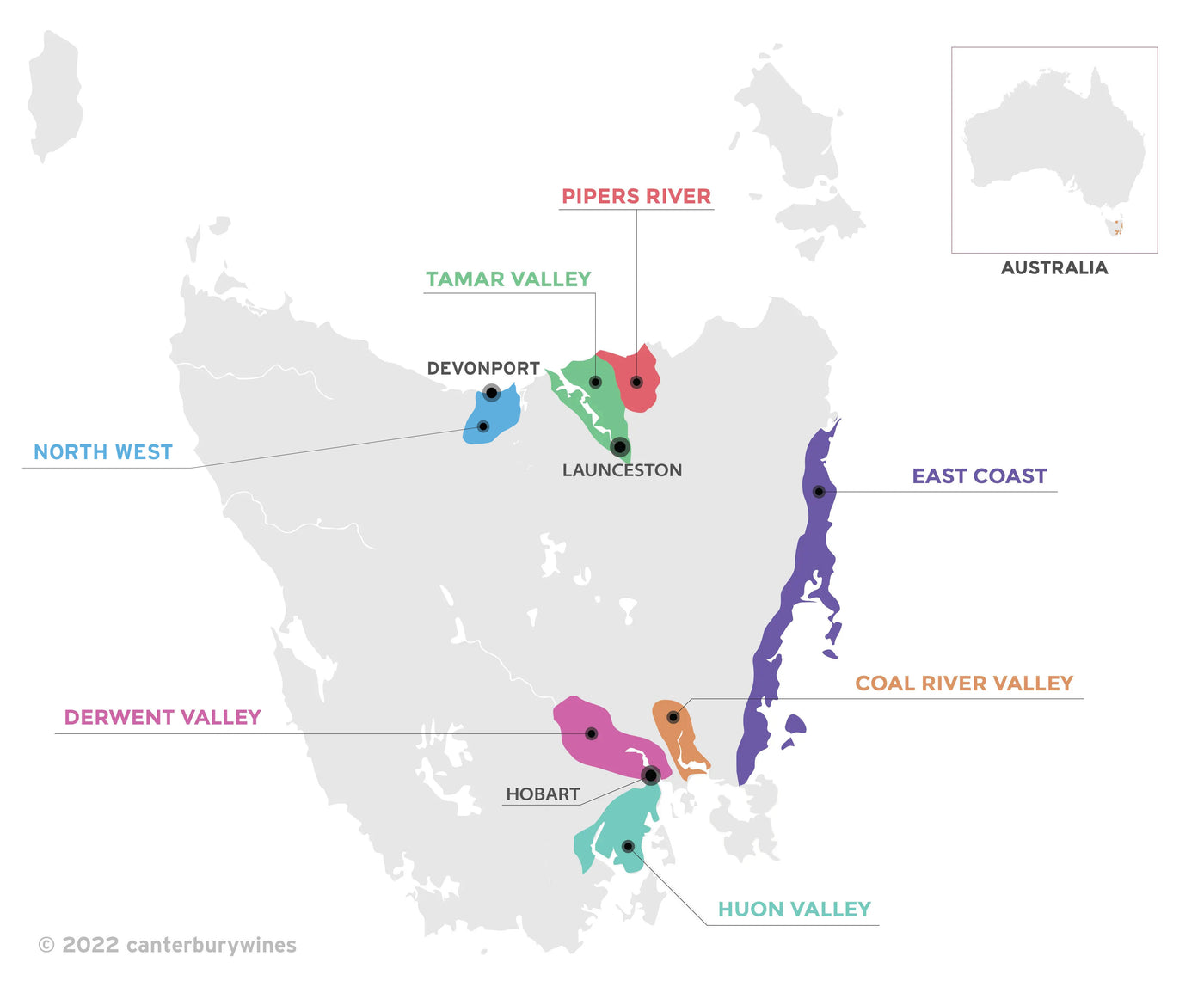

Hardys HRB Bin D692 Riesling 2021
Style: White Wine
Closure: Screwcap
Hardys HRB Bin D692 Riesling 2021
Warehouse
34 Redland Drive
Vermont VIC 3133
Australia
Critic Score: 95
Alcohol: 12.5%
Size: 750 ml
Drink by: 2031
The Hardy wine empire was established in 1853 by Thomas Hardy, generally regarded as the father of the wine industry in South Australia. When Hardys celebrated its 150th anniversary in 2003, more than 7.6 million cases of wine were being sold worldwide under the brand each year, and Hardys Wines was the second most powerful wine brand globally. Hardys HRB (Heritage Reserve Bin) wines are cross regional blends of hand selected parcels of fruit. The 2021 HRB Bin D692 Riesling is a blend of fruit from three classic Riesling producing regions; Tasmania and the Clare and Eden Valleys in South Australia.
"A highly sophisticated riesling with a dry Germanic twang, more pronounced than the typical Australian. By this I mean the meld of bath-salt freshness and phenolics; lime cordial, quince, lemon balm, fennel and stone-fruit inflections; juicy acidity, rather than the brittle norm. A glimpse of yonder, while still firmly entrenched in the culture of home. Lightweight and energetic. Intense of flavour and beautifully tactile. This evinces class and authority. Very good." Ned Goodwin MW
"The 2021 HRB Bin D692 Riesling is a skillfully blended combination of three of Australia's greatest Riesling regions; Tasmania, Clare Valley and Eden Valley. These exceptional parcels of fruit have created a wine of incredible intensity and vivacious citrus flavour, displaying a core of vibrant lemon and aromatics, with a racy citrus and green apple flavoured palate. The finish provides a line of minerally acid, giving powerful, lingering length and persistence. A truly classical expression of Australian Riesling." Hardys
Expert reviews
"A highly sophisticated riesling with a dry Germanic twang, more pronounced than the typical Australian. By this I mean the meld of bath-salt freshness and phenolics; lime cordial, quince, lemon balm, fennel and stone-fruit inflections; juicy acidity, rather than the brittle norm. A glimpse of yonder, while still firmly entrenched in the culture of home. Lightweight and energetic. Intense of flavour and beautifully tactile. This evinces class and authority. Very good. Drink: 2021-2031." Ned Goodwin MW, Halliday Wine Companion - 95 points and Special Value Wine ★
Awards
Special Value Wine – Halliday Wine Companion ★
Thomas Hardy

The Hardy wine empire was established in 1853 by Thomas Hardy, generally regarded as the father of the wine industry in South Australia. Thomas migrated to Australia in 1850 at the age of 20 with just £30 in his pocket and went to work in the vineyard for John Reynell at the Chateau Reynella winery. Reynell was the first to plant a vineyard in McLaren Vale and made his first vintage in 1842.
Within a year Hardy trekked to the Victorian goldfields to earn some money. Two years later he returned to South Australia and purchased a property on the River Torrens in the outskirts of Adelaide. He named the property Bankside, planted vines in 1853 and Hardys Wines was born. In 1857 he made his first wine, matured in a cellar which he dug by hand at night after his day's labours in the fields.
By 1859 Hardy was exporting wine to England and marketing his wine throughout South Australia and business was so successful that by the mid 1870s Hardy's Bankside Cellars were close to their production capacity and the wine company was looking to expand. In 1976 he purchased the Tintara Winery and vineyard in McLaren Vale when it went bankrupt. He was the only bidder for the 283 hectare property. Hardy recouped the total purchase price from the first year sales of the accumulated wine stocks that came with the purchase.
From this point on the business grew rapidly. In 1881 a large head office was built in Adelaide and in 1884 a further 195 hectares adjoining Tintara were purchased. In 1887 Hardy's three sons joined the business and Hardys Wines became Thomas Hardy & Sons, with sons James, Thomas Nathaniel and Robert leading the company into the next century. This marked the formalization of a family legacy that would endure for generations.
By 1895 Hardys had overtaken Seppelt as the largest winemaker in Australia, with a vintage of 1.5 million litres. In addition, Hardy played an instrumental role in protecting South Australia's vineyards from the scourge of phylloxera as a founding member of the Phylloxera Board in 1889. Federation in 1901 and the opening of State borders to free interstate trade offered Thomas Hardy & Sons another major opportunity. Within weeks of Federation the company opened offices in Sydney and Melbourne, followed by Brisbane in 1905. In 1904 his original winery at Bankside burned down but Thomas took it in his stride, moving on to a new larger site at Mile End. In 1910 Thomas's son Robert took over management of the company.
Thomas Hardy passed away in 1912, two days shy of his 82nd birthday. His contributions to the South Australian wine industry were immeasurable. His dedication, innovation and unwavering commitment to quality established the foundations of the region’s winemaking prowess. From pioneering exports to embracing technological advancements, Hardy’s legacy continues to live on in the vineyards and wineries of McLaren Vale and beyond.
His journey started as a young man who boarded a ship to Australia in 1850 with £30 to his name and by the time he died he was known as the father of the South Australian wine industry. His vision, perseverance, hard work and tenacious spirit built a company that is still going strong over 170 years later.
As a tireless promotor of Australia's wine industry, Hardy became the first Australian winemaker to be honoured by his local community, with the people of McLaren Vale erecting a stone plinth to honour his memory some 26 years after his death.
About the winery

The Hardy wine empire was established in 1853 by Thomas Hardy, generally regarded as the father of the wine industry in South Australia. Thomas migrated to Australia in 1850 at the age of 20 and three years later purchased a property on the River Torrens in Adelaide. He named the property Bankside, planted vines and Hardys Wines was born.
By 1859 Hardy was exporting wine to England and marketing his wine throughout South Australia and business was so successful that by the mid 1870s Hardy's Bankside Cellars were close to their production capacity and the wine company was looking to expand. In 1976 he purchased the Tintara Winery and vineyard in McLaren Vale when it went bankrupt.
In 1887 Hardy's three sons joined the business and Hardys Wines became Thomas Hardy & Sons, with sons James, Thomas Nathaniel and Robert leading the company into the next century. This marked the formalization of a family legacy that would endure for generations.
By 1895 Hardys had overtaken Seppelt as the largest winemaker in Australia, with a vintage of 1.5 million litres. Federation in 1901 and the opening of State borders to free interstate trade gave Thomas Hardy & Sons another opportunity to expand - within weeks of Federation the company opened offices in Sydney and Melbourne. In 1904 the original winery at Bankside burned down but Thomas took it in his stride, moving on to a new larger site at Mile End.
Thomas Hardy passed away in 1912, two days shy of his 82nd birthday. He was survived by his son Robert, who had taken over management of the company in 1910. The chain of command passed to Robert’s nephew, Thomas Mayfield Hardy, in 1928, thence to Robert's son, Kenneth Hardy, in 1938 when Thomas Mayfield was tragically killed in a plane crash. His widow Eileen Hardy, a woman of immense character and fortitude, immediately stepped up, taking on a role with Hardys that would define the rest of her life.
The winery celebrated its 100th anniversary in 1953, by which time it had extended its operation to the Barossa Valley and the Riverland on the Murray River. By the early 1960s the fourth generation of the Hardy family was on board, with Tom Mayfield’s eldest son Thomas Walter taking over the running of the company in 1965.
In 1970 it was decided to keep the best 4500-litre parcel of red wine made in the vintage separate and to release it under the Eileen Hardy name. The first Eileen Hardy Shiraz was released in 1973 to mark the 80th birthday of 'Auntie Eileen', the matriarch of the family. Eileen died in April 1980, followed by the death of her son Thomas Walter some 8 months later.
Before his passing, Thomas Walter had suggested the company move to Chateau Reynella, the winery established by John Reynell and the first place Thomas Hardy worked after coming to Australia. In 1982 Thomas Hardy & Sons purchased the heritage site and meticulously restored the beautiful building and grounds (at a combined cost of $5.8 million) to serve as its headquarters.
Hardys Wines continued to explore new regions in Australia and abroad, including wineries in France and Italy. It was a costly time, so Hardys Wines went public. In 1992 the winery moved out of family control when Thomas Hardy & Sons merged with Berri Renmano Ltd, a wine company based in Riverland, to form Australia's second-largest wine group at the time, BRL Hardy Ltd.
Hardys celebrated its 150th anniversary in 2003. It had a lot to celebrate, as more than 7.6 million cases of wine were being sold worldwide under the brand each year, or a staggering 2 million glasses being drunk every day. Hardys Wines was named the number one Australian wine brand and the second most powerful wine brand globally. As ABC National Rural News observed at the time, "Old Thomas Hardy would be very proud of how far his company has reached."
In 2003, BRL Hardy Ltd and Constellation Brands merged to create the world's largest international wine business and was renamed The Hardy Wine Company. In 2006, Constellation Brands acquired Vincor International, adding the West Australian brands of Amberley and Goundrey to the Hardy portfolio. In 2008, The Hardy Wine Company changed its name to Constellation Wines Australia, then to Accolade in 2011.

Tasmania
Tasmania is a small island located below mainland Australia. It produces less than 1% of Australia’s wine but enjoys a global reputation as a leading producer of premium cool climate wines. It is prized for its top-class sparkling wine, Pinot Noir, Chardonnay and Riesling.
Tasmania is home to more than 230 wineries across 7 wine regions*. The reigions Coal River Valley, East Coast, Pipers River and Tamar Valley produce around 90% of Tasmania's wine, while the other three regions Derwent Valley, Huon Valley and North West produce the remaining 10%. * Please note these 7 wine areas are considered here to be subregions of Tasmania to aid site navigation.
Tasmania is the coldest wine State in Australia. Its climate is temperate, with a distinct maritime influence from the Tasman Sea to the east, Bass Strait to the north and the Indian Ocean to the west. Summer days are temperate while winter sees some of the coldest temperatures in Australia. It's unique climate and soils combine to create ideal growing conditions for cool-climate grape varieties.

